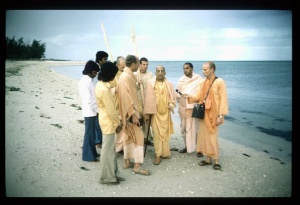SB 10.83.8

A.C. Bhaktivedanta Swami Prabhupada
TEXT 8
śrī-rukmiṇy uvāca
caidyāya mārpayitum udyata-kārmukeṣu
rājasv ajeya-bhaṭa-śekharitāṅghri-reṇuḥ
ninye mṛgendra iva bhāgam ajāvi-yūthāt
tac-chrī-niketa-caraṇo 'stu mamārcanāya
SYNONYMS
śrī-rukmiṇī uvāca—Śrī Rukmiṇī said; caidyāya—to Śiśupāla; mā—me; arpayitum—in order to offer; udyata—holding at the ready; kārmukeṣu—whose bows; rājasu—when the kings; ajeya—invincible; bhaṭa—of soldiers; śekharita—placed upon the heads; aṅghri—of whose feet; reṇuḥ—the dust; ninye—He took away; mṛgendraḥ—a lion; iva—as if; bhāgam—his share; aja—of goats; avi—and sheep; yūthāt—from a group; tat—of Him; śrī—of the supreme goddess of fortune; niketa—who is the abode; caraṇaḥ—the feet; astu—may be; mama—my; arcanāya—for the worship.
TRANSLATION
Śrī Rukmiṇī said: When all the kings held their bows at the ready to assure that I would be presented to Śiśupāla, He who puts the dust of His feet on the heads of invincible warriors took me from their midst, as a lion forcibly takes his prey from the midst of goats and sheep. May I always be allowed to worship those feet of Lord Kṛṣṇa, the abode of Goddess Śrī.
PURPORT
Lord Kṛṣṇa's pastime of kidnapping Rukmiṇī is narrated in detail in chapters 52 through 54 of the Śrīmad-Bhāgavatam's Tenth Canto.